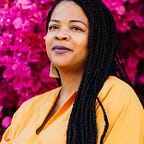Non-monogamy
We are encouraged to mark folks’ relationship to us, to always identify in relationship to the other. Upon introductions, we say this is “my” partner, “my” child, “my” sibling. We are taught to lay claim to folks, to see them as possessions and extensions of ourselves, to ultimately uplift our identity and ties. This fosters the idea that the actions of autonomous individuals impact who we are, what our worth is, help measure whether or not we’ve succeeded. A lot of this is colonial, hetero-patriarchal, capitalist.
Common misconceptions about polyamorous/ non-monogamous folks are that we’re slutty, selfish and sex craved. That our forms of relationship building aren’t meaningful, consistent and/or ethical. That there is something inherently wrong with how we engage and/or that we’re constantly dating multiple people at a time.
My experiences with non-monogamy have taught me to be more in my body, to be more in connection with other Black folks, to be touched and say when touch is not welcome. My practice of non-monogamy is not centered around sex. It is driven by connection, abundance, Black restoration and self actualization. It asks big and small questions that aren’t reliant on getting fast answers, boosting egos and marking.
I’ve learned that the relationships that sustain me are my friendships, especially intergenerational friendships. I am surrounded by a particular type of love, laughter and accountability that isn’t reliant on domesticity, when and how our flesh meets, when and if we have children. These intentional practices of care are what get me through. The nudes that I receive and send to friends, the pep talks, the breathing exercises that folks do with me over the phone when a panic attack arises, babysitting, cooking, making things with our hands, holding hands, hugs.
These ways of showing up for each other are a commitment to future building, focused and gentle listening and modeling alternatives. When I consider how we are shaping newer and old ways of intimacy, friendship is at the center not on the margins.
When we divest in love, connection and relationships as ownership and possession, we build an alternative way of being that honors all. Not who we know, have known or who we’ve loved. But who we are now, who we’re striving to be. We can honor our “romantic” connections without making that the center of who we are.
More later.
